It’s that time of year when many ponder how they can serve their fellow man and extend generosity to all. This holiday season, Senior Bowl executive director Jim Nagy introduces MB to seven of the 50-plus alumni who have joined his philanthropic Ambassador Club volunteer program. In an effort to reach young aspiring athletes, these amazing current and retired football players are selflessly taking goodwill into overtime.
“We would be doing our city a disservice if we didn’t mobilize these guys and get them into the community to reach our youth,” says Nagy. “With the Senior Bowl as their platform, they’ll be able to go out and do great things.”
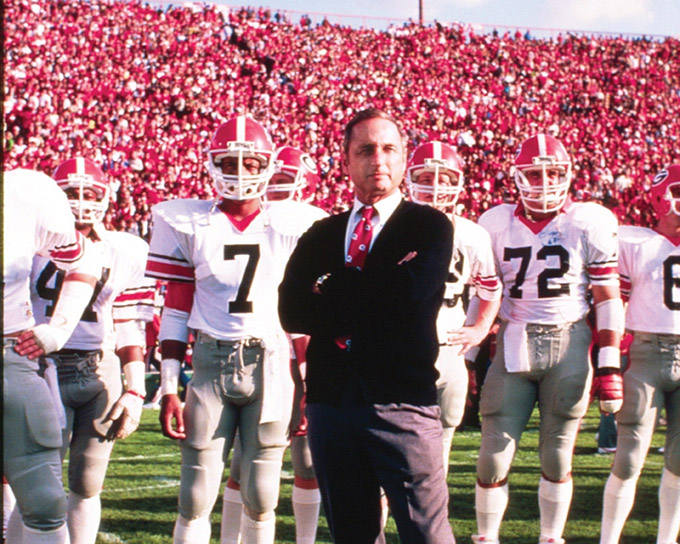
VINCENT “VINCE” JOSEPH DOOLEY
AUBURN UNIVERSITY QUARTERBACK: 1951 – 1953; AUBURN UNIVERSITY ASSISTANT COACH: 1956 – 1963;
UNIVERSITY OF GEORGIA HEAD COACH: 1964 – 1988,
ATHLETIC DIRECTOR: 1979 – 2004
If there were ever to be a Southeastern conference coach walk of fame, Vince Dooley would certainly have his own star plastered on pavement alongside the names of other legendary football demigods. The 86-year-old Auburn grad and former quarterback is most prominently known for his 25-year coaching career at the University of Georgia, where he led the Bulldogs to six SEC championships and one national championship.
But, despite a lifetime of fame, awards and achievements, Dooley is still every bit the football-loving Southern gentleman from Mobile that he always has been. It all started at the McGill Institute for Boys, now known as McGill-Toolen Catholic High School, where a group of nuns ironically played a vital role in his earliest love for the game.
“Back then, you only had radio, so we all listened to Notre Dame football because the nuns would indoctrinate us into following them,” he says. “Then we would go out to the streets and try to imitate what we had heard the players doing.”
At the time, no one would have predicted that Dooley would one day score free tickets for a group of Mobile nuns to attend the 1980 championship between his Georgia Bulldogs and Notre Dame. As the story goes, the nuns were thankful — but still cheered for the Fighting Irish.
In his youth, Dooley fell in love with both football and basketball, but excelled in the latter, which allowed him to acquire a college scholarship to Auburn.
“If it hadn’t been for the scholarship, I might not have even gone to college,” he says. Dooley would later suffer a knee injury that cut his playing time short. However, after acquiring an additional master’s degree in history, coaching for several years and writing a few books along the way, Dooley has become a nationally renowned sage of Southern football wisdom.
“I have a great affection for the city of Mobile. It has been a haven for sports, and it means a lot to these athletes, as well as the fans who follow it with pride. The Ambassador program is a great idea, and I’m proud to be on board.”
ROBERT LORENZO BRAZILE JR.
JACKSON STATE UNIVERSITY TIGHT END: 1971 – 1974; HOUSTON OILERS: 1975 – 1984
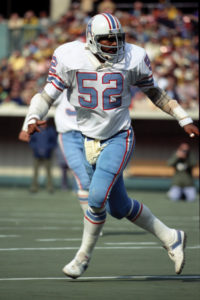
There was a time when 6-foot-4-inch, 241-pound hall-of-fame linebacker Robert Brazile Jr. would take his stance on the filed for the 1970s and -80s Houston Oilers, and his mere presence would strike fear into the heart of the opposing quarterback. But, before being chosen as the No. 6 overall pick in the 1975 NFL draft, young Robert was just an ambitious kid and a determined athlete at Vigor High School.
“I was the oldest of three boys, and we lived in Whistler,” says Brazile. “Growing up there was one of the best things that ever happened to me. I had five good uncles who set great examples for me.
“In grade school, my Uncle Odell, my mother’s brother, would load us up on his truck and take us to other parts of the city, like Prichard and Eight Mile, to play midget league-style football.” Brazile says his earliest love for the game developed during these formative years.
After high school graduation, Brazile became an All-American at Jackson State University and soon acquired the nickname “Dr. Doom” for his intimidating playing style on the field. “It stood for ‘Death on Offensive Men.’”
For Brazile, professional football was never about the money. He simply loved the game. The money was just a chance for him to give back, an example that he undoubtedly will set for all of the kids he reaches through the Ambassador Club.
Even today, at 65 years old, Brazile has a passion for instilling character in the next generation of players. In 2005, he retired from coaching at Vigor High School and now travels around Mobile visiting the local park teams. He hopes that by joining Nagy’s organization he can have a positive influence on today’s youth who need a good father- or brother-like role model in their lives. “A lot of kids today don’t realize the importance of character. You show your character when you’re out there by yourself, when no one else is looking. I always tell this to my kids and every kid I come across.”
JALSTON DEMONTREZ FOWLER
UNIVERSITY OF ALABAMA RUNNING BACK: 2010 – 2014;
TENNESSEE TITANS: 2015 – 2017, RE-SIGNED 2018
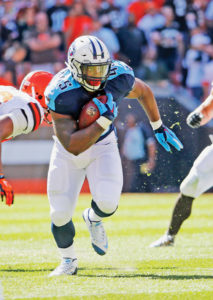
Twenty-eight-year-old two-time Alabama Crimson Tide national champion and Vigor High School graduate Jalston Fowler has ambition, passion and determination. From the time he was a baby — or “nudie baby” as his father lovingly referred to him — he was saying, “Hut, hut.”
His neighborhood, the original Orange Grove projects, was tough, but says Fowler, “It was a lot of fun growing up there because kids were running around all the time, playing sports together. We were out there every day trying to prove to each other that we were the best kid around.”
His skill in the park leagues eventually caught the eye of then-Vigor coach Kerry Stevenson (now with Alabama), who was so set on Fowler playing for Vigor that he would personally talk him out of attending Murphy. Fowler became a star athlete at Vigor, excelling not only in football, but also in track and field and basketball. He continues to maintain a standard of excellence in the NFL and attributes much of this positive perspective to his early days at Vigor.
“[My teammates and I] went through a lot of trials together. We had people pass away. People got sick. There was a lot going on. But we made it through, and we won the state championship in 2008.”
During his subsequent college days at the University of Alabama, Fowler came to respect and appreciate Nick Saban’s detail-focused coaching style. “If you can’t do it right, then you don’t play for Coach Saban.”
After being picked up in the fourth round of the 2015 NFL Draft by the Tennessee Titans, Fowler would go on to play three years of professional football, an experience he says was still “all about the details.” After a brief stint as a free agent, he is now re-signed with the Titans for another season, but his desire to mentor young athletes is also a major focus.
“I know what it’s like to come from the projects and grow up being poor. I like for kids to be able to ask me questions and get an honest answer. I like to see kids become successful.”
BRYANT JACOB “JAKE” COKER
FLORIDA STATE UNIVERSITY QUARTERBACK: 2010 – 2013;
UNIVERSITY OF ALABAMA QUARTERBACK: 2014 – 2015; ARIZONA CARDINALS: 2016 – 2017

All-American star athlete Jake Coker developed a love for football from an early age. “I started playing when I was 8 years old. My brothers and cousins were older than me. We were always playing football in the backyard. College football and competition is what really got me hooked, though. My dad’s side was obsessed with Alabama, but mom’s side was obsessed with Auburn. My older brother, Patrick, played at Air Force, and I’ve always looked up to him.”
Coker attended St. Paul’s Episcopal School and outperformed many of his teammates and rival athletes in football, basketball and track and field. “St. Paul’s did so much for me, and so many kids are able to sign and go places because of the foundation, faculty and staff there.”
In June of 2010, Coker committed to Florida State University where he was redshirted as a freshman and played as a backup for Erik “EJ” Manuel Jr. After earning his undergraduate degree, Coker transferred to Alabama.
“When I got to Alabama, I had a rough year of not starting. I had a lot of injuries, and that’s when my perspective started to change. I realized how special it was to play college football. Alabama was my dream school. Jimbo Fisher, to me, was one of the best quarterback coaches in the country, and [FSU] gave me an offer first. [But] I came to the realization that what I wanted was to win the national championship with Alabama.”
And that’s precisely what Coker would do on Jan. 11, 2016, when he led the Tide to an intense 45 – 40 victory over Coach Dabo Swinney’s Clemson Tigers. It was an experience unlike any other, though Coker humbly says being chosen captain was more than enough for him.
“I had been [at Alabama] for two years. I felt like the guys respected me. When they told me I was elected as a captain by the team itself, that meant the world to me.”
It’s this value for a personal connection that Coker will certainly pass on to the next generation of aspiring young athletes.
“Individual relationships are far more important. I’ve seen guys who had the best intentions but didn’t have the kind of support system that I had growing up. Sometimes great guys have off-field issues, get mixed up in the wrong crowds or don’t understand the opportunities in front of them. I would like to help those kids and see them do well.”
RODNEY HUDSON
FLORIDA STATE UNIVERSITY LEFT GUARD AND TACKLE: 2007 – 2011;
KANSAS CITY CHIEFS: 2011 – 2014; OAKLAND RAIDERS: 2015
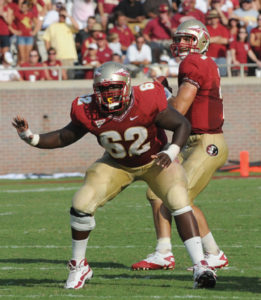
Rodney Hudson, a 29-year-old All-American pro football center, is proof that hard work pays off. Born in Germany because of his father’s military travels, young Hudson would eventually find his way to Mobile by way of Texas. From sixth grade on, he spent his time here playing youth football for Navco, an experience that would prepare him to succeed as a two-way lineman at B.C. Rain High School. “Coach Anthony Shamburger was instrumental in my development and made sure my grades stayed where they needed to be and that I attended the camps,” says Hudson.
While juggling his high school academics, intense workouts and practice schedules, Hudson also took a job at a Kentucky Fried Chicken (KFC) in order to help support his single mother. “Working there taught me work ethic, responsibility and productivity.”
Hudson would go on to achieve academic and athletic success at Florida State University. “I truly felt accomplished when I earned my scholarship to college because I come from a family where only one uncle went to college on a scholarship and graduated. So for me to take that financial burden off my mom was a big moment.”
With the Seminoles, Hudson played under legendary coaches Bobby Bowden and Jimbo Fisher. In 2011, he was drafted by the Kansas City Chiefs as the 55th overall pick in the second round of the NFL. Then, in 2015, Hudson signed on with the Oakland Raiders, a phenomenal career move that included a much more lucrative contract.
“There are about 1,500 people in the NFL, so for me to be one of them and to do what I love to do and get paid for it is truly a blessing. It’s surreal and a dream come true.”
Hudson’s love for the Mobile community has inspired him to get involved in local philanthropic efforts, as well as to connect with Jim Nagy’s Ambassador Club.
“That’s really big to me — to help others who don’t quite have enough,” he says. “I’ve done backpack giveaways for local schools, and I’ve worked with feeding the homeless.”
Hudson realizes the importance of connecting with the next generation. “I plan on coaching high school football one day, but I don’t necessarily want to be a head coach. I would love to be a resource, more like a life coach, even if I can just reach one kid, whether it’s through a community project or just speaking to one student who needs to be pushed in the right direction.”
MARK BARRON
UNIVERSITY OF ALABAMA DEFENSIVE BACK: 2008 – 2011; TAMPA BAY BUCCANEERS: 2012 – 2014; ST. LOUIS/LOS ANGELES RAMS: 2014

“I’ve had a passion for football as far back as I can remember,” says Mark Barron, a current linebacker for the NFL’s Los Angeles Rams.Barron grew up in the Bessemer projects of Prichard and played his earliest youth football there before playing at Eight Mile.
“My cousin and I would play in the front yard of my grandmother’s house. I developed my passion for the game right there in that yard.”
At Booker T. Washington Middle School, one person, in particular, had a memorable impact on Barron. “Believe it or not, Robert Brazile was my sixth grade P.E. coach.”
Ironically, Barron would later star on the same St. Paul’s Saints high school team as former Alabama quarterback A.J. McCarron, who was most recently acquired by the Oakland Raiders. While at St. Paul’s, Barron played multiple positions, including linebacker, wide receiver and running back. He also competed in track and field and won several 5A state titles in shot put, discus, long jump and triple jump in 2008. But it would be his athletic scholarship to Alabama that would ultimately accelerate his football career.
“Being part of winning culture and being a winner as an individual became a standard for me,” says the two-time All American. “I learned a lot about pushing and believing in myself. It wasn’t always easy, but you have to believe in the system. Coach Saban implemented those techniques, and they worked. We won two national championships in 2009 and 2011.”
In 2012, Barron was selected as the seventh overall pick in the 2012 NFL Draft by the Tampa Bay Buccaneers and was traded to the Los Angeles Rams in 2014. Now he hopes to instill in the next generation that same passion for winning and those same standards of excellence.
“Young athletes should know it’s not always going to be easy, but I would say to them, ‘Believe in yourself through those times.’ A lot of kids these days lose belief in themselves and they fail before they even try. You have to put in the work to be the best at whatever you’re going to do.”
PATRICK “PAT” WHITE
WEST VIRGINIA UNIVERSITY QUARTERBACK: 2005 – 2009; MIAMI DOLPHINS: 2009; WASHINGTON REDSKINS: 2013 – 2014;
ALCORN STATE UNIVERSITY QUARTERBACK COACH
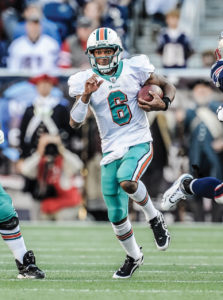
West Virginia University football star Pat White knew when it was time to return to his Southern roots. In 2014, he journeyed north to Canada, where he would play for a year in the Canadian Football League (CFL) with the Edmonton Eskimos. The following year, he would announce his official retirement. Having previously played in the NFL, both with the Miami Dolphins in 2009 and the Washington Redskins in 2013, White has seen and experienced the inherent differences between professional leagues. He even had a brief stint with the United Football League (UFL) in 2011 when he signed with the Virginia Destroyers. But for the man who once earned the Alabama Athlete of the Year award, it all started in Baldwin County.
“I was born and raised in Daphne,” says White. “Growing up there was great because it has such a small-town feel, and it’s full of family. Even if the people aren’t blood-related, they all seem like family. I played youth football for Navco. I give those coaches a lot of credit for my love for the game. I also had a lot of opportunities to see the Senior Bowl practices in Fairhope, where we would beg for players’ autographs. Those are some of my earliest memories of the game.”
He eventually accepted a job as offensive coordinator and quarterback coach for Alcorn State University in Lorman, Mississippi. But that doesn’t mean he’s forgotten his hometown.
“Although I did leave the state to play college ball, I still know where I’m from and appreciate what the city of Daphne gave me. Anytime I can give back, I want to be able to. Before I came to Alcorn, my brothers and I opened a training facility in Daphne. It’s called Blueprint Performance, a skills development company for athletes looking to learn for the next level.”
By joining the Senior Bowl Ambassador program, White hopes to expand his outreach, while also passing along the wisdom he’s acquired over his athletic journey.
“Hopefully I can help other young men live out their dreams and, more than anything, I want to continue to build strong relationships in the Mobile and Baldwin County areas. I want to have an effect on the greatness of this area and the athletes who come from here.”





